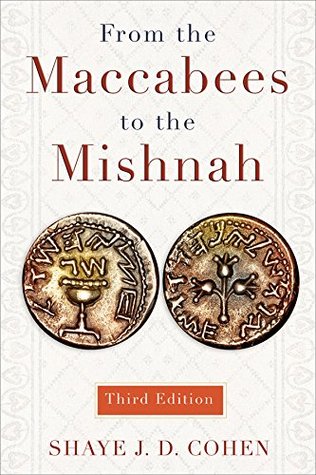More on this book
Kindle Notes & Highlights
Read between
September 16 - September 26, 2018
fomented
The rebellion of the Maccabees prevented Judaism from becoming just another local variation of Syrian Hellenism and thereby saved it from extinction. The
God will redeem Israel by sending the messiah, and Israel can do nothing to hasten the appointed time.
shoot shall come out from the stump of Jesse.”
the war of 132–135 was the revolt of the land of Israel, or to be more accurate, the district of Judea. Its leader was Simeon Bar Kosba, or Kosiba, better known as Bar Kokhba (“Son of a Star”), the name given to him by those who accepted his messianic status.
Rabbinic literature confirms that during and after the war the Romans forbade circumcision as well as other Jewish practices (including recitation of the Shema, public study of the Torah, and observance of the Sabbath),
In the rabbinic imagination, Hadrian was another Epiphanes, another gentile ruler who sought to destroy Judaism, but for us Hadrian’s motives, as well as those of Epiphanes, remain obscure.
From biblical until modern times, Jews have seen themselves, and have been seen by others, as a distinct group.
The Greeks drew a similar distinction between “Hellenes,” the bearers of enlightened culture, and “barbarians,” the members of foreign nations, and the demarcation between Jew and gentile is analogous to that between Hellene and barbarian.
vaunted
New Testament passages like Acts 6:1, which speaks of tension between the “Hebrews” and the “Hellenists” in the early church, contributed to this conception as well.
debased
bolster
It is a mistake to imagine that the land of Judea preserved a “pure” form of Judaism and that the Diaspora was the home of adulterated or diluted forms of Judaism.
basic problem that confronted all the Jews of antiquity was how to preserve Jewish identity while living within Hellenistic culture.
This was a perpetual dilemma, not only for the Jews in their homeland but especially for the Jews in the Diaspora.
the prophets objected vociferously.
Greek was the exclusive language of literary expression for Diaspora Jewry.
ancillary
boors;
Armenian, Coptic, and Syriac literatures, all of which were heavily imbued with Greek ideas.
way of thought and a way of life.
“apostates” (rebels).
The most spectacular example of this type is Tiberius Julius Alexander, the nephew of the philosopher Philo, who abandoned his Judaism for the sake of a government career.
motivated by the desire to partake fully of the delights of Hellenistic
civilization.
“uprooted intellectuals” who could accept the truths of Greek philosophy but had difficulty accepting the truths of Judaism.
known to modern scholarship as “the extreme hellenizers” tried to remove the distinctive characteristics of Judaism in order to make it indistinguishable from other forms of Semitic-Hellenistic polytheism.
“extreme allegorists” who argued that the laws of the Torah, including the laws of circumcision, Sabbath, and forbidden foods,
castigates
The Wisdom literature of the Bible (Proverbs, Job, Ecclesiastes) completely ignores the distinctive elements of Israelite cult, history, and theology; freely draws on the wisdom literature of the ancient East, especially Egypt; and emphasizes the common morality and ethics applicable to all peoples.
ideal solution
synthesis between Judaism and Hellenism.
of Judith, originally written in Hebrew,
The beauty of Japheth did indeed reside in the tents of Shem.
The God of the Hebrew Bible is very different from the supreme God of Plato or Aristotle.
its first great exponent was Philo, and its origins reach back to Alexandrian Jewry of the third century BCE.
idea was completely foreign to Judaism.
(synedrion, or, in Hebrew pronunciation, sanhedrin).
ancient Near East, a groom “buys” his bride from his prospective father-in-law by tendering a “bride-price.”
groom receives money or goods (a dowry) from his prospective father-in-law in advance of the marriage.
the shift from polygamy to monogamy)
“How?” and “How far?”
partake
bounty
Hellenization was not to be confused with assimilation. This tension is also evident in the social relations between Jews and gentiles.
Caesar, the emperor Augustus, and other high Roman officials protecting the Jews’ right to observe their ancestral customs, including the right to observe the Sabbath and not to serve in the army.
the refusal of the Jews to participate in any religious ceremony,
Jews alone of all the peoples of antiquity were monotheists who believed in a jealous God.
mob


